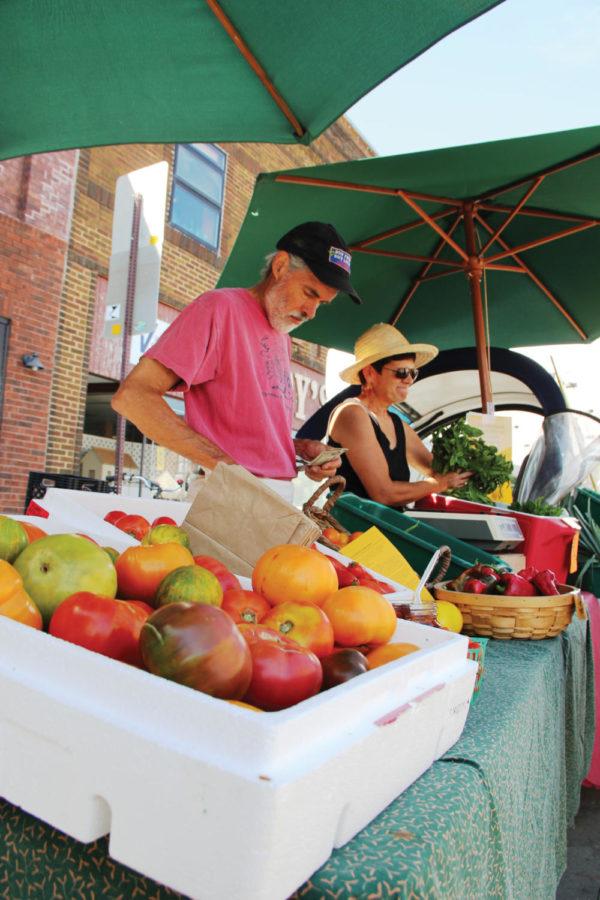Editorial: Local foods: Eat them
Photo: Emily Harmon/Iowa State Daily
Jon Lynch and Lonna Nachtigal, of Onion Creek Farms, organize their goods at the Ames Famer’s Market on Saturday, Aug. 27. The Ames Farmer’s Market hosts a variety of stands, all of local flavor.
November 18, 2013
Food is perhaps the most basic product we consume. Ever since our distant ancestors first learned to grow and raise their own sustenance, we have been moving ever onward in our quest to make bigger, better and cheaper food.
In that quest, the food industry has become much like the other industries of the world. Food is “manufactured” in one place and processed somewhere else, only to be sold at other locations to consumers spanning the globe.
That largely industrialized process might seem appropriate to those living in large population centers far removed from the fertile plains that satisfy their collective hunger. Interestingly, in places like Iowa, we can look out our windows and see the fields where much of our food was grown. At the same time, the food on our plates might very well have traveled hundreds of miles on its journey to our stomachs.
What the food industry and market cannot provide might be just as valuable though. Locally or self-grown foods can offer a wide array of benefits ranging from low cost to improved local economies.
Supporting those who would grow food for local consumption is by no means a new phenomenon. Farmer’s markets have been around as long as there have been farmers and someone else willing to pay or trade for their food. Similarly, growing food for personal consumption, even among nonfarmers, is an age-old trend.
In our current world, however, it only makes sense that we would rather join in the nationwide market that promises consistent quality, year-round availability and convenient access to a host of different and even exotic foods.
Joining that market does not mean that we cannot also make sure some of our purchases are local foods. Here at Iowa State, our dining services has been making just that effort. Since 2007, our Farm to ISU program has supported locally grown, organic or otherwise alternative food sources.
That partnership seeks to increase the strength of Iowa’s agricultural industry by buying directly from Iowa farmers and Iowa distributors. There is also something to be said about connecting an institution like Iowa State with its surrounding community. With many students raised right here in Iowa, Iowa State can only benefit as an institution by giving back to the people of the state.
The food purchases that create such a connection are not simply charitable donations, though. The foods grown and sold through our Farm to ISU program and similar programs across the country have distinct benefits.
For one, organic foods, as many locally sold foods are, have a much smaller impact on the environment. The fact that organic produce and livestock are grown without synthetic fertilizers or as much off-site processing means that they have fewer of the negative effects that many industrially produced goods will have.
In an age of high oil prices, transportation is also a major factor in the cost of food. By buying locally, there is little, if any, excess movement of foodstuffs. That lower travel time can also lead to fresher foods, decreasing the need for artificial preservatives.
Along with the lower processing and additives that local foods contain, they allow for whole food alternatives. The health benefits of eating actual foods — not food products — are well known. In the words of Michael Pollan, who has written several well-known books on nutrition and the food industry: “Eat food. Not too much. Mostly plants.”
It should be noted that all of this does not mean local foods are a perfect alternative. Locally grown foods and organic foods still incur transportation costs and still have an environmental impact even though they do provide benefits that other food sources just can’t give.
In a state like ours, where local food is a realistic option for any of us, we should follow our university’s example and look into at least supplementing our regular grocery purchases with locally grown food.
We should do this not only for our state’s economy or for our environment, but for ourselves.







